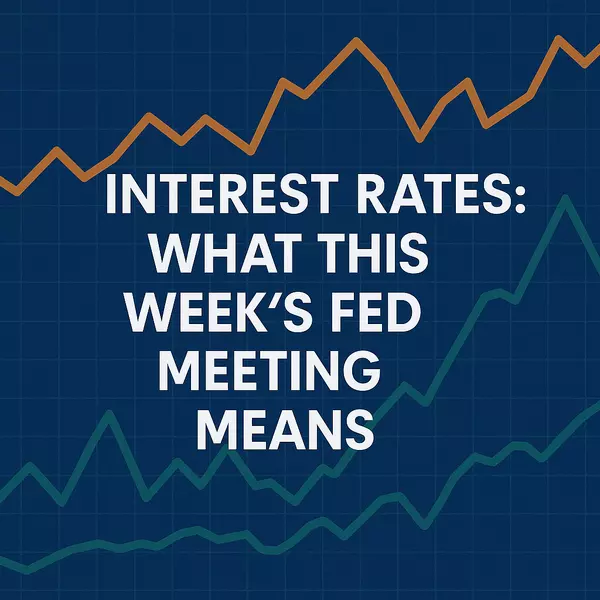Interest Rates: What This Week's Fed Meeting Means
It's been a key headline recently and something that the folks in the mortgage and real estate worlds have been anxiously awaiting - the Federal Reserve is meeting today and tomorrow (9/16-9/18/25). Why is this important, and what role does the Federal Reserve play in mortgage rates? Let's take a closer look.
What Is the Federal Reserve and What Is the Fed Funds Rate
The Federal Reserve is the central bank of the United States. One of its jobs is to manage the economy by setting short-term interest rates (NOT mortgage rates). The main rate it controls is the “federal funds rate.” This is the rate banks charge each other for overnight loans so they can meet required reserves. The Fed uses meetings of the Federal Open Market Committee (FOMC) to decide whether that rate should go up, down, or stay the same.
How Mortgage Rates Are Affected (Indirectly)
Mortgage rates are not directly set by the Fed, but they do follow what happens in certain markets, especially the market for U.S. Treasury bonds. A few things matter:
- The yield on the 10-year Treasury bond plays a big role. Mortgage rates tend to move along with that Treasury yield. When the yield falls, mortgage rates often fall; when the yield rises, mortgage rates often rise.
- Inflation and job market data also matter. If inflation is high, the Fed is more likely to keep rates higher so that prices don’t rise too fast. If the job market is weakening, that might push the Fed to lower rates to help the economy.
Why Mortgage Rates Dropped Recently
Recently, average mortgage rates dropped from the around 6.5% at the start of September to around 6.2% currently for a 30-year fixed mortgage. What caused that drop?
- Expectations of a rate cut by the Fed — Many investors believe that the Fed will lower its benchmark interest rate at its upcoming meeting. Those expectations change how bonds are traded and push down Treasury yields. Lower Treasury yields tend to pull mortgage rates down.
- Weaker job growth and softer inflation signals — With slower job growth and some inflation cooling, markets are more confident the Fed may act to lower rates.
What Might Happen After the Fed Meeting
The Fed meeting this week is expected to produce its first rate cut of 2025, possibly a quarter-point (0.25%) cut. But even if the Fed does but the rate by 0.25%, don't expect mortgage rates to fall overnight. Why? That's because the banks are expecting that and have already priced it in. But what could happen to mortgage rates based on what happens at the Fed meeting? Let's look at a few possibilties.
|
What the Fed Does / Says |
Likely Reaction in Mortgage Rates |
|
Scenario A: More Agrrssive Rate Cut + Dovish Forecast (Signals more cuts this year) |
Mortgage rates may drop modestly. Lower bond yields, more confidence from lenders, more refinance activity. Could bring rates below recent levels. |
|
Scenario B: Expected Rate Cut + Mixed Signals (Fed warns inflation or economic risk remain) |
Mortgage rates could stay about where they are, or drop just a little. Lenders might still price in risk. Some volatility possible. |
|
Scenario C: No Cut or Hawkish Tone (Fed holds rate steady or signals more tightening ahead) |
Mortgage rates could increase. Bond yields may rise, lenders adjust rates upward. The hopeful drop in rates might reverse. |
What This Means for You
- If you are thinking about buying a home or refinancing, now might be a good time to lock in a mortgage rate, especially if rates drop under Scenario A.
- Keep an eye on the Fed’s statement and forecast at the meeting. The language the Fed uses can move markets. Words like “further easing” or “caution” matter a lot.
- Expect some short-term movement. Mortgage rates might not drop a lot immediately, even with a cut, because other economic forces (inflation, job data, Treasury yields) also play big roles.
Bottom Line
The Fed sets short-term rates to manage inflation and employment. Mortgage rates are influenced by those Fed decisions, but also by what happens in the bond market, inflation, and the economy overall. The recent rate drop happened because markets expect the Fed to cut rates soon. After the upcoming Fed meeting, mortgage rates could stay about the same, go down more, or go up depending on what the Fed does and what economic signals follow.
Recent Posts











